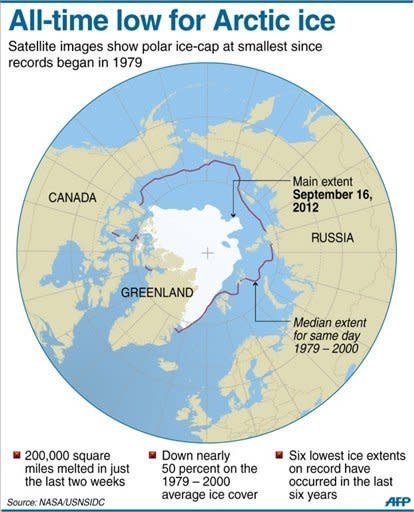Global warming freezes world economy: report
Climate change caused by global warming is freezing the world economy, a report commissioned by 20 of the world's most vulnerable countries said Wednesday. "Climate Vulnerability Monitor: a guide to the cold calculus of a hot planet" says global warming will not only lead to environmental catastrophe, but is already choking the international economy. Key findings include estimates that carbon-intensive economies and associated climate change are responsible for five million deaths a year, nearly all of them due to air pollution. "Failure to act on climate change already costs the world economy 1.6 percent of global GDP amounting to $1.2 trillion in forgone prosperity a year," said the report released at the Asia Society in New York. In addition, "rapidly escalating temperatures and carbon-related pollution will double costs to 3.2 percent of world GDP by 2030." According to the report, "unprecedented harm" is being inflicted on humanity. However, tackling climate change's causes would instead bring "significant economic benefits for world, major economies and poor nations alike," the report said. Former Costa Rican president Jose Maria Figueres said at the Asia Society that there was a "fantastic" opportunity in steering away from carbon-intensive economies. "There's a tremendous amount of opportunity in terms of development around the world as we reinvent everything," he said. "This is where the future is." Anything less, he said, is "in some ways similar to rearranging the chairs on the deck of the Titanic." The report says that while poorer countries face the steepest economic damage in terms of GDP losses, big countries will not be spared. "In less than 20 years China will incur the greatest share of all losses at over $1.2 trillion. The US economy will be held back by more two percent of GDP; India, over five percent of its GDP," the report said. It said these projected losses "dwarf the modest costs" of addressing climate change. The climate forum's chairman, Bangladeshi Prime Minister Sheikh Hasina, said weather pattern changes would be especially devastating for her crowded country. "One degree Celsius rise in temperature is associated with 10 percent productivity loss in farming," she said. "For us, it means losing about four million metric tonnes of food grain, amounting to about $2.5 billion. That is about two percent of our GDP. "Adding up the damages to property and other losses, we are faced with a total loss of about three to four percent of GDP." A sea level rise of a meter (three feet), she said, would inundate a fifth of low-lying Bangladesh, displacing nearly 30 million people. "The scenario would be just as horrifying for small island developing states like Maldives, Kiribati and Tuvalu." Jeremy Hobbs, executive director of the aid agency Oxfam International, called the report "another reminder that climate change's most savage impact is hunger and poverty." "The economic and social costs of political inaction of unchecked climate change are staggering," he said. "Behind the statistics are the stories of real families and communities, for whom climate change means putting children to bed with empty stomachs."




